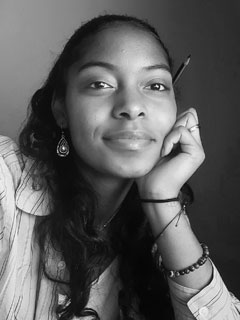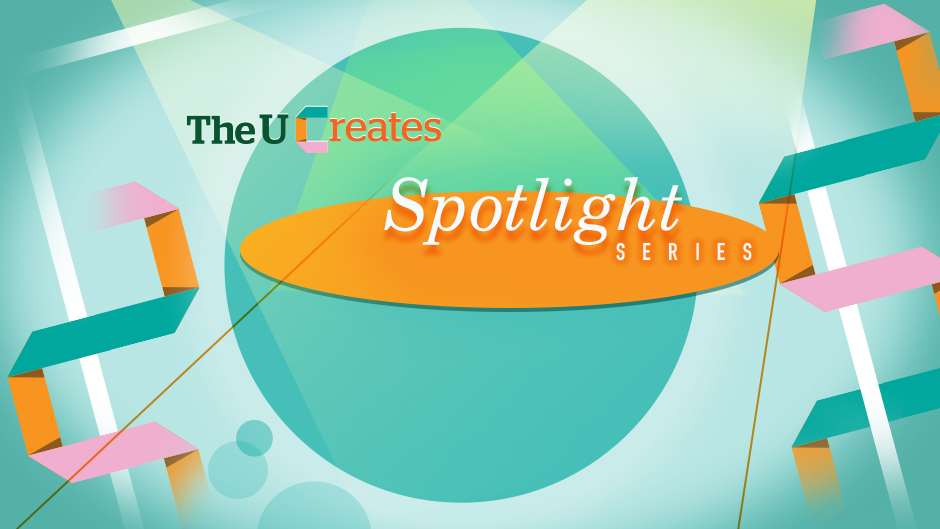As the arts continue to face challenges because of the pandemic, the University of Miami is exploring new and creative ways to highlight the incredible spirit of our students. Despite the obstacles, students and faculty from all facets of the arts and humanities are leading the charge in South Florida’s growing arts and culture community. In the new “Spotlight” series, meet the creatives, thinkers, and dreamers behind The U Creates and find out what drives their innovative inspirations.
 In the first “Spotlight” feature, meet Paris Rene James.
In the first “Spotlight” feature, meet Paris Rene James.
- Tell us a little bit about yourself (name, major, graduation year, interests, what makes you, you?)
My name is Paris James. I am a freshman majoring in architecture who is expected to graduate in May 2025. Since I was a kid, I had a strong interest in music, more specifically songwriting. I loved creating melodies and sculpting lyrics, because it always brought me great joy. The way my heart would jump out of my chest when I would finish a song or create the catchiest chorus felt rejuvenating. My love for creating music led me to loving to create art with a multitude of other mediums. My driven, innovative personality, along with my curly hair, is what makes me who I am.
- What is something you are working on this year and would like to share? Or something that you are really passionate about? And why is it important to you?
I am passionate about solving intra-community injustice. Whenever given the chance, I talk about colorism within the Black community because I strongly believe if I further the discussion and educate those who are unfamiliar about it, then I am helping to dismantle it. I have always been taught that community, love, and support start from within. Therefore, I believe that a healthy community starts within the circles we connect ourselves to. If we build ourselves and each other up, then we are all helping to build a better community. This is true of political, racial, and ethnic communities, or even communities that seem small and obscure.
This year, I have made it a point to work on a number of things. The first was to get organized and to figure out what it is I want in the short term. Throughout high school I neglected making short-term goals, which caused me to not fully live in the moment but to always worry about what was ahead. The second thing I want to do is to dedicate time to working on my music. Since I was 16, I had been planning this huge album that I wanted to release. And I think it’s time for me to focus on what I want. Third, I want to get involved in building up my community back home. New Orleans is known for gentrification and racially divided neighborhoods. In the Big Easy, you get used to pot-holed streets; rotten, abandoned shot-gun houses; and grimy corner stores covered in graffiti. However, if you turn to the next block you would wonder if you were even in the same neighborhood. You would find big, beautiful houses; perfectly trimmed lawns; and dazzling Mardi Gras beads dripping from the French engraved balconies. Ever since I watched Bryan Lee’s TED Talk on architecture and race, he made me really want to address those issues and he helped me decide on choosing architecture as my major. - How has living through a pandemic changed the way you create?
I went to two high schools. Benjamin Franklin and New Orleans Center for Creative Arts. I was so used to creating every day, whether it be a short film, a dance routine, music with my band, or just a quick poem. I was used to being around other artists who have a need to express themselves and address the issues in their communities through their art. On March 13, 2020, we were told that school would be online, and I sort of lost hope in creation. I had to begin to tell myself that being an artist isn’t about what others see, whether you're inside or outside, in a huge crowd, or isolated, etc. It was definitely difficult, but what helped me was being the master editor for my senior class’s documentary, “Lost and Found.” Editing this documentary reminded me of why I am an artist. And it’s because of the stories I get to tell, the issues I get to advocate for, and the emotions I get to release. The pandemic made me approach creating in a more sensitive way. Before the pandemic, I thought creation was about the end result instead of the process. However, living through a pandemic with no clear end in sight made me truly appreciate the quality of my art instead of the quantity. - How do you nurture your creative spirit?
It makes me seem a bit crazy, but to nurture my creative spirit I talk about it with myself. (I promise I don’t answer me.) But on a serious note, I either journal about it, make bullet points, or turn on my phone’s voice recorder and note my thoughts, lyrics, or whatever it is I need to get out. Other moments, I go over it with my friends and/or my bandmates. I observe other artists as well, who can give me confidence or can introduce me to something new.
Visit www.arts.miami.edu for more information on the arts and humanities.

